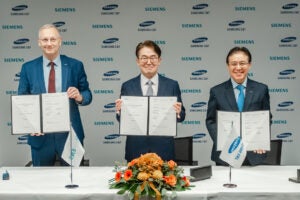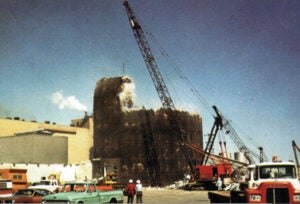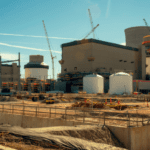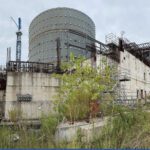Loan guarantees for new nuclear power plants in the U.S. should not be awarded until the Nuclear Regulatory Commission (NRC) has fully reviewed plans for a proposed project and granted it a combined construction and operating license (COL), Rep. Ed Markey (D-Mass.) told Energy Secretary Steven Chu last week.
“Otherwise valuable taxpayer support would be set aside for a project that may not pass regulatory review,” the chair of the House Energy and Environment Subcommittee said in a letter (PDF) to Chu.
The congressman’s concerns were raised by the NRC’s Oct. 16 notice to Westinghouse Electric Co. that it had not adequately demonstrated the structural strength of certain components of its AP1000 reactor design, specifically for the shield building. The shield building protects the reactor’s primary containment from severe weather and other events, but it also provides a radiation barrier during normal operation and supports an emergency cooling water tank.
Though the NRC would continue reviewing the remainder of the next-generation reactor’s design certification amendment application, it told Toshiba Corp. in a letter that it expected the company to make design modifications and conduct testing to ensure the shield building design could sustain its safety functions.
Markey’s letter was also prompted by a statement made by Secretary Chu in mid-October that the Department of Energy would announce $18.5 billion in nuclear loan guarantees “very soon.” Chu has also reportedly suggested that the amount of loan guarantees for nuclear energy should at least be doubled in the Senate climate bill.
Seven of 17 COL applications are based on the AP1000 design. These include two projects said to be shortlisted for the DOE’s loan guarantees: Southern Co.’s Vogtle plant in Georgia and Scana Corp.’s V.C. Summer plant in South Carolina.
The decision prompted groups to block construction of two new reactors at Plant Vogtle, saying that it could cause delays, which would in turn drive up costs—which ratepayers will be forced to pick up. On Tuesday, however, plant owner Georgia Power testified to the Georgia Public Service Commission that the $14.4 billion project would be on schedule and within budget. Officials also said that that the price tag for the two new reactors had dropped $1.5 billion from when the company requested permission to build them, reported the Augusta Chronicle.
Projected construction costs dropped because “the company is avoiding some interest by charging its customers for the reactors before they begin operation,” the newspaper said.
Markey also said the DOE should take into account concerns by nuclear regulators in France, the UK, and Finland about the design of AREVA’s EPR. Last week, those bodies asked in a joint statement that the control and safety systems within the reactor be independent from each other to avoid both systems failing at the same time. AREVA has said it would modify the design of the reactor before the end of the year, according to Reuters.
“When a new drug treatment is proposed or a new car manufactured, the safety of these products must be ensured before they hit the marketplace,” Markey said. “These principles of safety and fiscal responsibility are especially applicable to new nuclear power plants. Withholding loan guarantee commitments until a project obtains regulatory approval ensures that taxpayers do not assume the financial risk of new reactor construction unless the loan guarantee applicants have demonstrated with certainty that their reactor designs are safe, effective, and meet applicable NRC regulations.”
Sources: Rep. Ed Markey, Reuters, Augusta Chronicle, POWERnews









